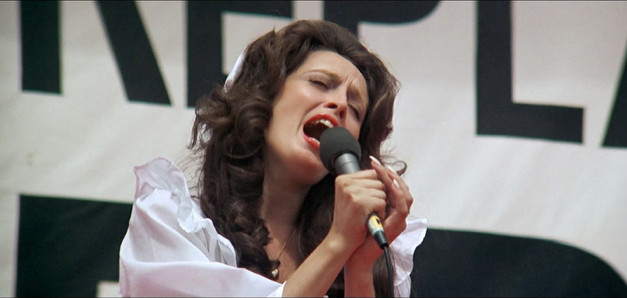[Editor’s Note: Nashville screens at Film Streams, 1340 Mike Fahey St, on May 1st, 3rd and 5th. Visit filmstreams.org for tickets and showtimes. Justin Senkbile is a writer and filmmaker living in Omaha. Reach him at jmsenkbile@gmail.com.]
* * *
At their core, nearly all of the 30-odd feature films made by Robert Altman are built around the romance of American myth, the absurdity of American reality, and the frequent inanity of the American people. Within his huge body of work (14 titles from which will screen at Film Streams through June 8, as part of their latest Great Directors Series), 1975’s Nashville stands as one of the most vibrant illustrations of those central ideas. If you follow the narrative of Altman as a rewriter of old movie genres, Nashville counts as his loud, colorful, Nixon-era musical.
At just under three virtually plotless hours, Nashville spreads its myriad textures, sounds and cast members over just a handful of days in the Tennessee capitol, somewhere in the early 1970s. All twenty-plus main characters are introduced in the whirlwind first half hour, which catapults us through a few recording sessions, out to the airport for the arrival of a cattle-queen country singer (and a whole bunch of other people), and finally drops us right in the middle of a cartoonish traffic jam, en-route back to the city.
Much of the movie speeds along like this, a function mostly of the complexity and number of its moving parts. Altman and writer Joan Tewkesbury skip us around from stage to bar to studio to hotel room, mapping out a city where even the least-connected person has some place in the musical ecosystem.
A few figures, though, do manage to surface as being central to the activity: local rhinestone idol Haven Hamilton (Henry Gibson), for example, and the troubled singer Barbara Jean (Ronee Blakey). There’s also Barbara Jean’s steely rival Connie White (the peerless Karen Black), and a vaguely corporate folk trio, in town to record, fronted by Keith Carradine’s bored lech Tom Frank.
A different viewer could conceivably single out different names as being central, which is only natural since there really are no lead characters in the usual sense. Each character serves more like a guidepost, a spot from which Nashville can spin even further outward, in order to catch all kinds of other interesting people in its orbit, like Geraldine Chaplin’s BBC reporter, Gwen Welles’ heartbreaking Sueleen Gay, or Jeff Goldblum’s tricycle-riding magician (not kidding).
There’s also the persistent presence of an idealistic, Carter-esque presidential candidate named Hal Philip Walker. Though we never so much as glimpse the guy, his banners and bumper stickers color nearly every shot, and his campaign vehicle, blasting a recording of a Walker speech, is never far away.
Walker is more than just another in Altman’s parade of bodies chasing dreams and jostling for attention – though he is that, too, personified by Michael Murphy’s elegantly manipulative campaign manager. Walker’s message is also a prism through which we can view the entire movie. He’s the real center of Nashville; not for the characters, but for us. In fact, the first real lines in the whole thing come blaring from a loudspeaker atop a Walker car: “All of us are deeply involved in politics, whether we know it or not, and whether we like it or not.” Which leads to a perfect example of Altman’s dyspeptic wit: that ominous maxim is immediately followed by Haven Hamilton pompously warbling the emptiest kind of patriotic radio smog.
As a constant in the film, Walker is second only to the music. Altman has done little to hide his distaste for the Nashville sounds of the period, but a case could be made that here he actually takes the music more seriously than the characters. While the vastness of the cast sometimes reduces whole performances to emotional punctuation marks, a huge chunk of running time is devoted totally to music. And in what has to be one of the most amazing bits of movie trivia, not only did every cast member of Nashville do their own singing, most of them even wrote their own songs.
Altman often described his work in terms of painting, but Nashville feels more like a novel in the size of its vision and the way it mines such a small, specific universe in pursuit of it. Perhaps most unique is the breadth of the culture it embraces, in terms of style (dive bar bluegrass to lacquered pop-country), quality (session experts to tuneless dreamers), and context (stock-car races, Sunday church services, the Grand Ole Opry). Like most of Altman’s movies, Nashville is all about complicated relationships between individuals, generations and cultures. Here, the most complex of all is probably the one between these people and their music. For residents of Altman’s Nashville, music truly is everything, a comfort and distraction, an identity and a ritual.




